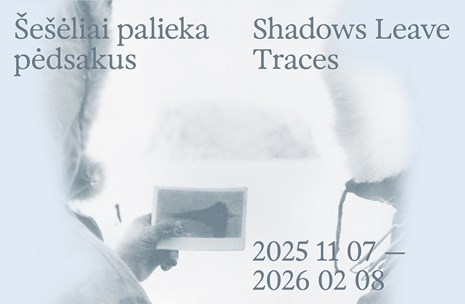Shadows Leave Traces

Shadows Leave Traces
International Exhibition on the Memory and Imagination
of the Northern Landscape
The North has long been imagined as both a geographical and
symbolic frontier. Behind this illusion lie colonial ambitions -
often invisible, yet persistently present. Today, the North is
increasingly linked to planetary decline and geopolitical tension:
the destruction of local cultures, the intensification of resource
extraction, and the looming ecological and military threats.
The culture of Lithuania and the wider Baltic region bears a
distinct imprint of the North. Artists, travellers, naturalists,
and thinkers have journeyed to the Arctic, driven by curiosity and
a search for identity. At the same time, centuries of Russian
imperialist policy involved the inhabitants of our region into the
colonization of the North. Particularly painful are the testimonies
of Soviet repression - deportations, imprisonments, forced labour,
and military service in the Far North.
The exhibition brings together these experiences and stories from
the early twentieth century to the present day. Through artworks,
archival and documentary materials from Lithuania, Latvia, and
Estonia, it reflects not only the history of our region but also
that of the North itself. For the first time, this material is
presented alongside works by Finnish and Norwegian artists, in
which the North emerges not as a symbolic or abstract space, but as
a site of belonging, cultural tension, and the preservation of
identity.
The connections between the Baltic and Northern regions explored
in the exhibition invite reflection on embodied environmental
experience, imagination, trauma, and (post)memory, viewed through
the lens of the Northern - primarily Arctic - landscape. Drawing on
the idea of anthropologist Tim Ingold, we propose to see the
landscape not as something in front of us or opposed to us, but as
something with us. The landscape is not a static image or passive
backdrop, but an accumulation of past and present processes -
traces of both presence and absence. At the same time, it reminds
us that humans are part of a broader biological and cultural
fabric.
Curators: Kotryna Markevičiūtė, Gabrielė
Radzevičiūtė
Architect Povilas Marozas
Graphic designer Ugnė Balčiūnaitė
Coordinator Giedrius Gulbinas
Producing architect Mindaugas Reklaitis
Audiovisual technician Vytas Narbutas
Copyeditor Audra Kairienė
Translators: Aušra Simanavičiūtė, Emilija
Ferdmanaitė
Authors and expedition participants presented in the
exhibition: Vello Agori (Gori), Jurijus Baltrūnas,
Juozapas Berkmanas, Daumants Birznieks, Jūratė
Bičiūnaitė-Masiulienė, Izabelė Bindler-Danilova, Gražina
Čižauskaitė-Jucienė, Viktorija Daniliauskaitė, A K Dolven, Adomas
Galdikas, Elena Gaputytė, Marja Halonen, Marja Helander, Tadas
Ivanauskas, Einari Junttila, Stasys Jusionis, Valentina
Karatajūtė-Talimaa, Juozas Kazlauskas, Leonardas Kazokas, Maija
Kellokumpu, Aleksandras Kostkus-Kostkevičius, Ignas Krunglevičius,
Silvi Liiva, Johan Lövholt, Nota Liubošicas, Ruth Maclennan,
Gintautas Martynaitis, Edmundas Mulokas, Kazys Pakštas, Kalervo
Palsa, Outi Pieski, Pranciškus Porutis, Kaljo Põllu, Vilhelms
Purvītis, Jorma Puranen, Kristjan Raud, Petras Repšys, Kajėtonas
Sklėrius, Alexander Ivanovich Snegirev, Julijonas Algimantas
Stankevičius-Stankus, Vitalis Staugaitis, Lina Straigytė, Vladimir
Fedorovich Stranich, Rūta Spelskytė, Suohpanterror, Romualdas
Svidinskas, Juozas Žagelis, Edvardas Žižys, Antanas
Žmuidzinavičius.
Exhibits were loaned by: Vilnius University
Geology Museum, National Museum of Lithuania, M. K. Čiurlionis
National Museum of Art, Lithuanian Photographers Association,
Lithuanian Central State Archives, Art Museum of Estonia, The
Estonian Academy of Arts Museum, Finnish National Gallery
Collection / Museum of Contemporary Art Kiasma, Tukums Museum,
Rovaniemi Art Museum, Latvian National Museum of Art, Museum of
Occupations and Freedom Fights, Lithuanian National Museum of Art,
Galleri Bo Bjerggaard, Gražina Čižauskaitė-Jucienė, Viktorija
Daniliauskaitė, Dalia Kazlauskienė, Ignas Krunglevičius, Ruth
Maclennan, Edmundas Mulokas, Laimutė Nagelienė, Edmundas Saladžius,
Rūta Spelskytė, Vitalis Staugaitis, Romualdas Svidinskas, Algirdas
Šimulynas, Edvardas Žižys.
Acknowledgements: Laptevų jūros tremtinių brolija
(The Brotherhood of deportees from the Laptev Sea), communities of
polar expedition travellers and naturalists, Kazys ir Saulius
Damulevičiai, Aira Huovinen, Eglei Ivanauskaitė-Puodžiūnė, Aivaras
Jefanovas, Dalia Kazlauskienė, Kęstutis Kilinskas, Virginija
Liūgienė, Gintarė Lukoševičiūtė, Jonas Markauskas, Aldona
Markevičienė, Laimutė Nagelienė, Satu Oksanen, Agrita Ozola,
Cecilie Vindal Ødegaard, Laurynas Peluritis, Alfredas Radzevičius,
Eugenija Rudnickaitė, Irmantė Šarakauskienė, Elnara Taidre, Vilja
Talimaa, Antanas Terleckas, Rita Vipartienė.
Organiser: National Gallery of Art / Lithuanian
National Museum of Art
Project funded by: Culture Ministry of the
Republic of Lithuania
Sponsors: UAB Propeller, Exterus.Fundermax,
OCA, Embassy of Finland in Lithuania, Royal Norwegian
Embassy
Media partners: LRT, JCDecaux Lietuva


